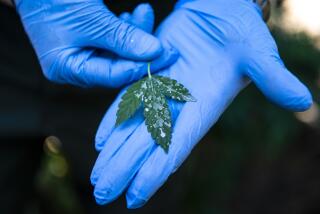No Intent to Deceive, Say Apple Growers
- Share via
Growers who supplied Alar-treated apples to a Southern California grocery chain said Thursday they did not knowingly deceive the supermarket into believing the fruit was free of the chemical.
On Wednesday, Hughes Market decided to test its apples for Alar after a laboratory examination for The Times found traces of the potentially hazardous chemical in some Hughes apples. The store could not determine the growers who supplied the apples tested by The Times, so Hughes tested apples from its warehouse.
Alar, the trade name for daminozide, was detected in three of seven samples tested by Hughes, and the store announced it would return those apples to the growers and continue testing on a regular basis.
Relied on Certification
Previously, supermarket executives said, they had relied on letters from growers certifying that no Alar was used on their apples.
But Tom Hanses, a partner in a company Hughes identified as supplying some of the suspect apples, said Thursday he was “not aware” that his company had sent Hughes a letter certifying that Alar had not been used. The Hughes test found Alar residues of 1.2 parts per million on Hanses’ apples. The allowable level set by the U.S. Environmental Protection Agency is 20 p.p.m.
“We have not issued a letter to them, to my knowledge, that all of our apples are Alar-free,” said Hanses, a partner in Washington Fruit & Produce Co. of Washington state. “We wouldn’t be able to do that because not all of our apples are Alar-free, although they are under the EPA tolerance standard. There is absolutely nothing wrong with those apples.”
On Thursday, Roger Schroeder, director of produce for Hughes Market, said that “to the best of my recollection” the store had received a letter from the Washington company certifying that Alar had not been used. However, he said, he could not immediately find it.
Hanses, whose company ships under the “Independent” label, said some of his apples were treated with Alar this year, but that others were not.
“We will not be using Alar in the future unless the attitude changes of the press--although we should use it,” Hanses said. “It is the best thing for apples. It will give the consumer a much better apple at no risk to his health.”
Alar is used to improve the appearance and extend the shelf life of apples. Without it, some growers contend, many apples will lose their crispness before reaching consumers. The EPA believes there will be 4.5 additional cancer cases for every 100,000 people who consume apples with average Alar residue over their lifetime. The agency is expected to ban the chemical next year.
Hughes said its tests also showed that some apples sold under the “Marley” label had residues of 3.6 p.p.m. Bill Gammie, president of Jack Frost and Marley Orchards in Washington state, said his company wrote a letter to Hughes saying: “It is our sincerest intent to comply with your request to make every effort to ship you food that has not been treated with the chemical daminozide during the past growing season.”
An Experiment
Gammie said he used Alar on five of his 3,500 acres in 1988 as an experiment to determine the chemical’s benefit. The apples that were treated with the chemical were sent to market in September, Gammie said, and none of his apples have since been treated or will be in the future.
He could offer no explanation for Hughes’ finding, except that it was possibly an error. Schroeder of Hughes said the store did not run second tests to confirm the positive findings. “It might behoove us to run second tests on this thing,” he said. Schroeder also said that it is “feasible” but not probable that the treated apples shipped in September could have been in storage until now.
The third batch of apples found by Hughes to have traces of Alar came from Evans Fruit Co. in Washington and are sold under the label “Top Red.” The company owns orchards and also packs and ships for other growers. Some of the “Top Red” apples had a reading of 2.5 p.p.m.
“We have about 35 or 40 growers,” said Jeannette Evans, who owns the business with her husband. “They tell us they do not have Alar on them. . . . We don’t know what we are going to do at this point.”
Lucky Stores Inc., meanwhile, announced Thursday it will soon begin testing its apples for Alar on a random basis to verify claims by growers that no Alar is used. Two samples of Lucky apples tested by The Times also were found to contain Alar residues.
More to Read
Sign up for Essential California
The most important California stories and recommendations in your inbox every morning.
You may occasionally receive promotional content from the Los Angeles Times.











